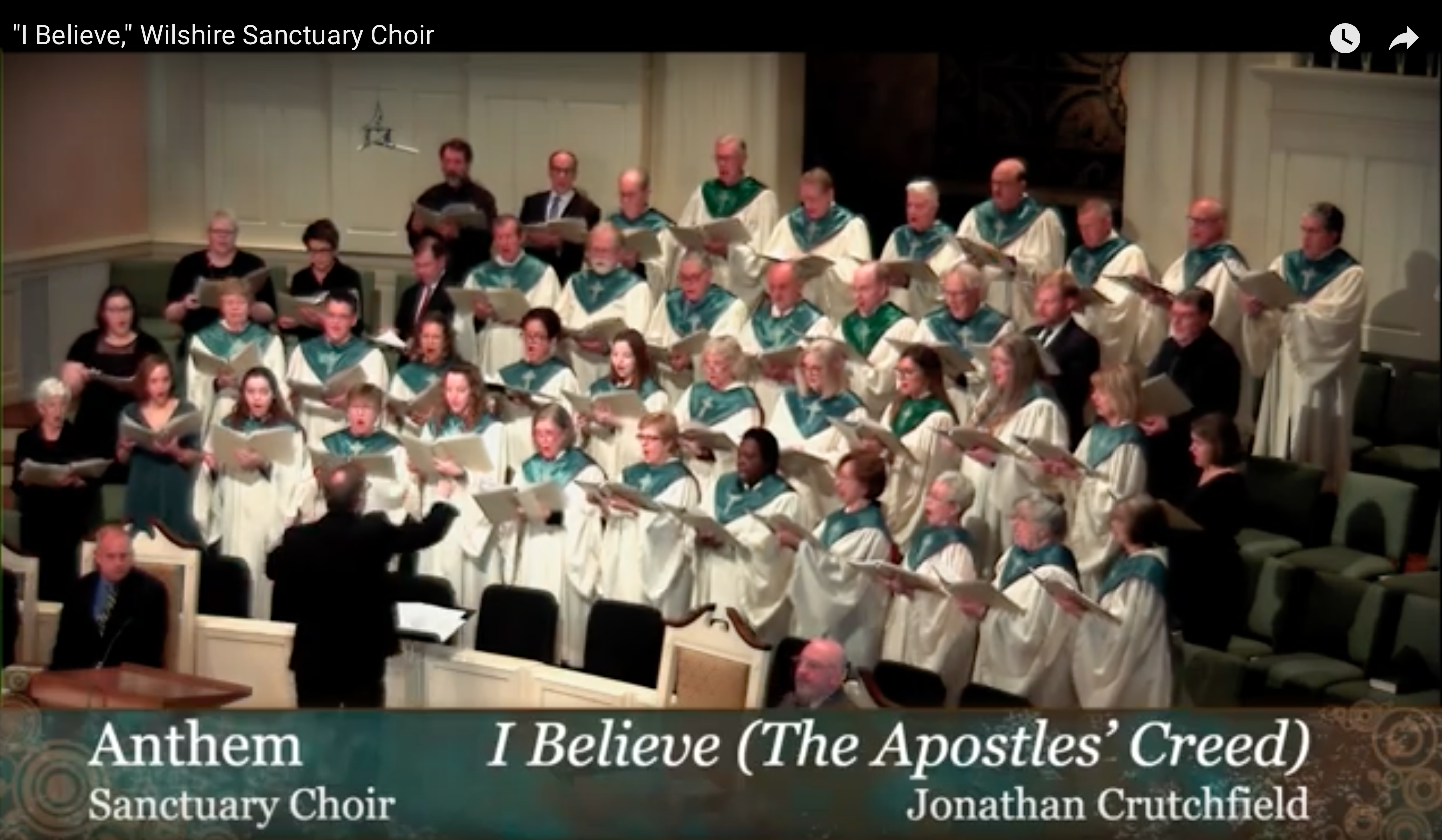A Wilshire church member walked up to me after worship recently and said: “That’s two weeks in a row. Sanctuary Choir is singing so well!” I said, “Well I’m glad our batting average is getting better,” and we both chuckled. That morning as part of a deacon ordination service the choir sang an anthem titled I Believe by Jonathan Crutchfield. The text is the Apostles Creed (“I believe in the Father almighty, maker of heaven and earth …”) and it is a majestic and mysterious piece accompanied by organ.
The Sunday before, the choir sang a black Gospel piece, Lord, Make Me an Instrument of Your Peace by M. Roger Holland II. Accompanied by piano, this setting of the prayer of St. Francis has a slow groove to it and the volume of the choir ranges from a shout to a whisper.
On most Sundays at Wilshire if you sit in the pew and worship with us, you would describe worship as traditional (this is a good word, although like its sibling-style word “contemporary” it can describe diverse experiences.) At Wilshire we offer one style of worship at 8:30 and 11:00 a.m.
From our website:
Worship is the heart of what we gather to do as a community of faith. We seek to worship the Triune God, not ourselves, not our culture, not even our own giftedness. We gather in worship to give thanks to God, to offer adoration to God, to pray for God’s mercy and guidance, to hear from God’s word and to be challenged to live for God’s kingdom.
Worship at Wilshire is “traditional,” in the sense that we seek to remain faithful to the stream of Christian and Baptist heritage that has shaped us. We do not start with the felt needs of the culture and then craft a religious experience to address those needs. Instead, we begin with the traditions of the church—the creeds, the hymns, the liturgies, the preaching—and invite people to join the ongoing stream of faith. [1]
Of course, in worship and music we have our standard fare. It’s a bit like your family dinner menu — you may regularly have (and love!) roast beef and potatoes, or spaghetti with a sauce that simmered all day, or that scrumptious chicken casserole. But trying something new expands one’s palate. My wife, Lori, is a remarkable cook. I love the meals in the “regular rotation” (our kids have a phrase for an entire menu that is known as “the roast beef dinner”) and yet she introduces new dishes with a sensitivity to our preferences that often become part of our go-to fare.
Wilshire has a long legacy of both tradition and innovation. A few years ago, I was doing some research in the church archives after the death of one of my predecessors, Bill James, who was minister of music at Wilshire from 1966 to 1999. I was fascinated to discover in old church worship orders and newsletters the remarkable breadth of music presented in worship: from Mendelssohn’s oratorio, Elijah, and of course, many performances of Messiah to many youth musicals. Ragan Courtney (lyricist and collaborator of Celebrate Life) and Cynthia Clawson were members of Wilshire in the early 1970s. Bill James led the church to sing classic hymns and choral music and added to this other newer expressions of faith.
While the music ministry has produced three CDs that are more traditional in nature: Carols We Love, Prayers We Love and Hymns We Love, we are in the process of producing an acoustic music project to be titled Wilshire Roots. This effort has been led by our gifted student minister, Darren DeMent. Here’s a brief description from the liner notes:
“Roots” music isn’t standard fare on Sunday mornings at Wilshire, but it slips in between the classical hymns and anthems more often than you would guess. In the Baptist tradition, our roots come from at least two streams — one more formal and one more informal. So it seems natural that those traditions would merge in our worship even today. When that happens, you’ll often find Darren DeMent on the mandolin at the center of things. For this album, Darren gathered up some of his frequent collaborators and captured a few of our congregation’s favorite pieces they have sung and played in recent years. We often say Wilshire is “a different kind of Baptist church.” Here’s evidence yet again.[2]
A few years ago at a Center for Healthy Churches consultant gathering, I was talking with Randy Ashcraft about our musical breadth at Wilshire. Randy said to me, “It sounds to me like the Wilshire music ministry has a really broad bandwidth.” I like that. Wilshire has a clear worship identity centered in a legacy of traditional church music, and we find space for other expressions of faith that contribute to our worship of God. I wonder if churches would be wise to worship together while expanding their musical bandwidth as an expression of the fresh winds of the Spirit.

Leave a Reply